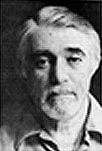|
|

|
Nader NaderPour
Poems
Iran
|
Translated to English by Manavaz Alexadrian
The Fortune-teller
The sun's honeycomb had fallen aside,
The bees of light had abandoned their flight,
From behind the trampled lawn of sky
The fresh red petals of twilight had newly spread.
The old fortune-teller of wind appeared from distance,
The yellow shawl of autumn wrapped around his neck;
That day he was the guest of the street trees,
To hear their secrets from his bright fortune.
Each step he advanced he was greeted by a tree,
Each branch stretched its palm towards him;
He brushed aside all these hands,
Like gypsies, he tuned a strange song.
He sang and sang so much that the evening magpies
Summoned the night from within the trees,
Alarmed of that sound the leaves fell to the ground,
as if a thousand swallows were shot in the air.
Night crossed like a stream over these leaves,
Each leaf was cut like a fist;
Although no image he read in these hands,
The fortune-teller of wind saw the fortune of each leaf.
O Earth, O Tomb, O Mother!
An old man who was walking behind the autumn-stricken trees,
Resembled my soul of 40 years age,
A soul more disturbed than the shade of hundred leaves
And more scattered than the trembling of hundred waves,
A soul ready to die,
An old man whose pointed staff
Continually disturbed the peace of that laughing spring.
It was my soul that was walking behind the autumn-stricken trees.
Ah I know:
No more this soul can see the sky
From the bright windows of dream;
It cannot look at trees and the sun;
Its strange sensation
- at sunrise after rainfall -
Shall no more breathe the wet perfume of the lawn.
His heart cannot escape the terror of the nights of old age.
Because he is too old,
His old age is dark and gloomy;
His old age is a dark chamber that has no opening to the street
Nor a street leading to the plain.
O I know!
That love that dawned on that morning of merry youth,
And touched the window of his cottage,
Has hidden its face from the unhappy soul,
And cast its desirous eyes to more youthful rivals.
He is too old,
His old age is dark and gloomy,
His face beams as it used to beam.
If at evening the mirror betrayed a single white hair
from his silky jet black curls,
Today in its withered silky white hairs
You can't trace a black string,
Here the sun won't shine but on a snowy night.
Ah I don't know,
Under this agitated and gloomy snow of old age,
Under this heavy grayness of forgetfulness
How many embers have survived from the light years?
How many embers from those nights
Which behind an orange curtain rain poured cats and dogs
And a woman washed a weeping child in the raining of his caressing hairs,
And sought the dumb gaze of the child in the father's eyes.
Some embers have survived from those days
When on the other side of the room a small wall mirror
Showed the constant motion of the cradle and the forehead of the mother,
And in that corner of the chimney piece the clock
Moved its long pointers
To and from
And the peasant women with henna dyed hands
Milked from swollen breasts of her cows at morning,
And the father was drinking in the leaf of iris.
The light of the brass cup boiled with loud echo,
And sprayed on the sun,
And the boiling Samovars
And the pale cups with golden edges ....
Cooled the tea with the cold morning breath.
Some embers have survived from those nights
When in the veranda the heart of an ancient torch burnt
And in the brazier, the dream of spring died,
And the sad ice flower.. carried the sad perfume of sunset
To the colorful border of dawn,
And the dawn gazed at the darkness of that young soul.
How many embers have survived from those nights
When his heart trembled with the blowing of perfume
And his body was inflated with a heartbeat,
And his lip
Repeatedly translated his language
With the help of kisses.
Some embers have survived from those times
In which a heart burning wrath breathed in his breast,
His breath was sincere;
His cry echoed at all horizons
And the awe of his wrath
Broke and shattered
The chandeliers in God's mansion,
And his pointed golden revolving finger tips,
Dropped in the heart of the most fresh turquoise light of morning
And truth were released from chains and fetters.
Ah it is long since that in his ruined and agitated recollections
From all these things nothing by recollection -
Dumb and dead and frying and disturbed - can't be found,
In the nocturnal chamber of his sorrow you can't find a ray of joy,
At times it sees the way to forgetfulness,
And says with regret:
"Ah old age, o the age of prudence!,
O forgetfulness!, O the cause of silence and joy!,
Removed all these disturbing recollections from my mind.
O earth, O tomb!, O mother!,
When shall I lie in your bosom?
Don't give my turn to another one.
Don't give my turn to another one.
|
|
|
